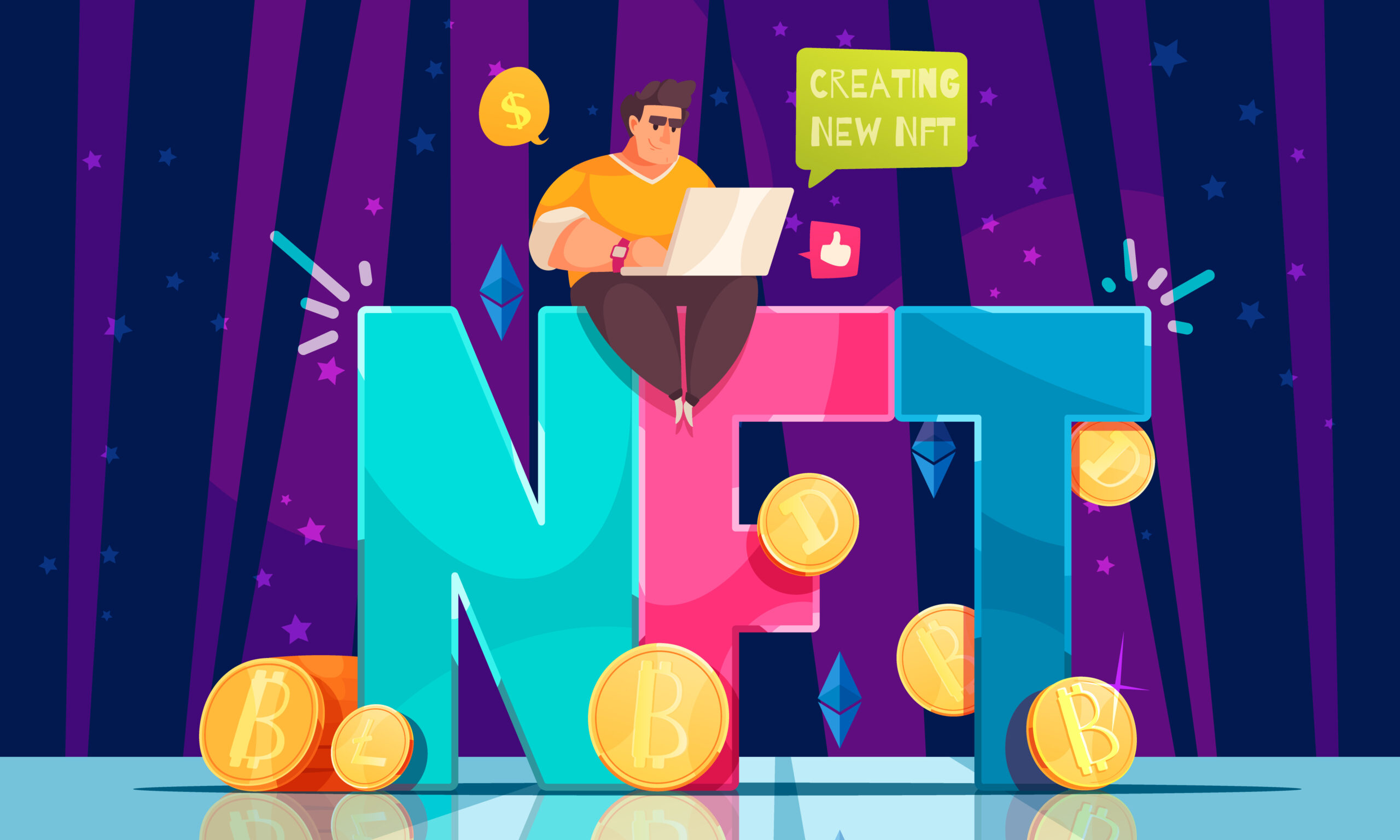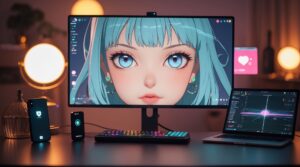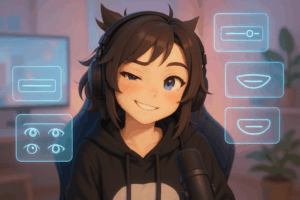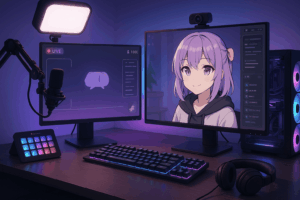The intersection of blockchain technology, crypto games and gaming has given rise to a revolutionary concept known as NFT (Non-Fungible Token) gaming. This innovative fusion has not only transformed the gaming landscape but also introduced novel opportunities for players and developers alike. In this comprehensive blog, we will delve deep into the world of NFT gaming, exploring its meaning, insights, and the promising future it holds.
Basics of NFT Gaming: What are NFTs?
NFTs, or Non-Fungible Tokens, are unique digital assets that are indivisible and cannot be replicated. Unlike cryptocurrencies such as Bitcoin or Ethereum, which are fungible and interchangeable, each NFT holds distinct properties and characteristics, making it one-of-a-kind. These properties are stored on a digital ledger called a blockchain, a decentralized digital ledger that ensures the authenticity and ownership of NFTs.
Overview of NFT and Blockchain in Gaming world
In the realm of gaming, NFTs and blockchain based technology have revolutionized the way players interact with in-game assets and economies. By leveraging blockchain technology, game developers can create and manage digital assets as NFTs, allowing players to truly own and trade their in-game possessions. This shift towards ownership and decentralization has profound implications for the gaming industry, ushering in a new era of player empowerment and economic opportunity.
The Impact of NFT Gaming
NFT Gaming is transforming the gaming industry by introducing new features in games. Players can earn in game currencies by accumulating game assets and accomplishments which were previously restricted only to the currency system in the game with no external value. It has enabled the emergence of play-to-earn models, where players can earn real-world value by participating in gameplay and acquiring valuable in game rewards and assets. This has led to increased player engagement and retention, as well as the creation of vibrant in-game economies. Moreover, NFT based game have opened up new revenue streams for game developers, fostering innovation and creativity in game design.
Understanding NFT Gaming Industry
Exploring NFT Games: Play-to-Earn Model and In-Game Assets
NFT games utilize a play-to-earn model, where players can earn rewards and valuable assets by engaging with the game. These assets, represented as NFTs, can range from in-game items and characters to virtual real estate and collectibles. By incorporating NFTs, game developers incentivize players to invest time and resources into their games, fostering a symbiotic relationship between players and developers.
How do NFT Games Work: Smart Contracts, Digital Assets, and In-Game Currencies
NFT games use nonfungible tokens to establish rules and how players play. Users of games based on NFT can use NFT to create characters or find, purchase NFTs for play. Generally, developers develop NFT games through smart contracts, an innovative contract that uses blockchain technology.
The underlying technology behind many NFT game developer and blockchain games, is based on smart contracts, self-executing contracts with the terms of the agreement directly written into code. These contracts govern the ownership and transfer of 3D assets, ensuring transparency and security for players. Additionally, NFT games often feature their own digital currencies or tokens, which can be used to purchase in-game items and participate in the game’s economy.
NFT games differ from many video games by their inherent value extending beyond gaming context. Smart contracting transfers the rights on NFT games work to players if the requirement has been met.
Core Gameplay Elements and Player Experience points
At the heart of NFT gaming are gameplay elements designed to provide immersive and rewarding experiences for players. These points may include quests, challenges, and competitive gameplay modes, all of which contribute to the overall enjoyment and engagement of the game. By integrating NFTs into these gameplay mechanics, developers create dynamic and evolving worlds where players can shape their own destinies.
Evolution of NFT Gaming Industry
Transition from Traditional Games to NFT-Based Games
The transition from to NFT games represents a paradigm shift in the gaming industry. Whereas traditional way of playing games relied on centralized systems and proprietary ownership of in-game assets, NFT games embrace decentralization and player ownership. This transition has sparked a wave of innovation and creativity leading games everywhere, as developers explore new ways to leverage blockchain technology in game design with NFT Gaming.
Growth of NFT Game Developers and Marketplaces
With the rise of NFT gaming, we have seen a proliferation of developers and marketplaces dedicated to the creation and exchange of NFT-based assets. These developers range from indie studios to established gaming companies, all vying to carve out their niche in the burgeoning NFT gaming market. Similarly, top NFT games and marketplaces have become hubs for buying, selling, and trading 3D assets, providing players with a seamless and secure platform to engage with the whole NFT based game ecosystem.
NFT Gaming: Exploring NFT Game Development
NFT Game developer play a pivotal role in shaping the landscape of NFT game, driving innovation and creativity in game design. Here’s a closer look at the key aspects of NFT game development:
Role of Game Developer in NFT Gaming industry
NFT game developers are pivotal in crafting immersive virtual worlds and engaging experiences for players. They conceptualize, design, and execute the gameplay mechanics, narrative elements, and visual aesthetics that define the game’s identity. Moreover, developers are tasked with integrating blockchain based technology and NFTs seamlessly into the game infrastructure, ensuring a cohesive and rewarding player experience.
Designing In-Game Challenges and Activities
Quests:
Quests are essential components of NFT games, offering players narrative-driven objectives to pursue. These tasks often involve exploration, combat, or puzzle-solving, adding depth to the gameplay experience. Moreover, completing quests may reward players with unique NFTs or in-game items, incentivizing progress and engagement in game pets.
Missions:
Missions are structured objectives that players undertake to achieve specific goals within the game. They can range from delivering items, escorting NPCs, or clearing out enemies from an area. By successfully completing missions, players can earn rewards such as NFTs, currency, or experience points.
Puzzles:
Puzzles provide mental challenges for players to solve, often requiring logic, pattern recognition, or lateral thinking. These puzzles can be integrated into the game environment, hidden within dungeons or scattered across the virtual world. Solving puzzles may grant access to hidden areas, unlock valuable treasures, or reveal secret lore, enhancing the overall gameplay experience in game challenges.
Competitive Events:
Competitive events pit players against each other other players in contests of skill, strategy, or teamwork. These events may include tournaments, races, or other games of player-versus-player battles. Participating in competitive events offers players the chance to demonstrate their prowess, earn recognition from the other players’ games, and claim exclusive rewards, including coveted NFTs.
Dynamic Challenges:
Dynamic challenges adapt to player actions and progress, providing a personalized and evolving gaming experience. Players can start playing and encounter challenges that dynamically scale in difficulty based on their level, ensuring a suitable level of challenge for every player. These challenges may also adjust in response to player choices, keeping the gameplay experience dynamic and engaging.
Whether facing off against their opponent’s life in intense battles or encountering unusual monsters trading cards with unique abilities, players are constantly immersed in the diverse world of games. Moreover, dynamic challenges may present opportunities during play to earn game acquire rare and valuable in-game NFTs, such as unusual cards or special items, adding an extra layer of excitement and reward to the gaming experience.
By incorporating a variety of quests, missions, puzzles, competitive events, and dynamic challenges into one game, creators can provide players with opportunities for progression, accomplishment, and reward, thereby fostering sustained interest and participation in the game.
Incorporating NFT and Blockchain Technology into Game Development
Incorporating NFT and blockchain technology into game development is a multifaceted process that demands a deep understanding of gaming mechanics and blockchain principles. Developers work closely with experts in blockchain technology to seamlessly integrate features like asset tokenization, smart contracts, and decentralized ownership into the gaming experience. By harnessing blockchain technology, developers can guarantee the authenticity, scarcity, and transferability of game assets, including NFT cards and digital content, thereby enhancing the overall player experience.
Additionally, the incorporation of blockchain technology opens up opportunities for additional gameplay elements, such as it simulates economic competition and facilitates interactions with other players through non-fungible tokens (NFTs). This integration not only adds depth and immersion to games but also fosters a sense of ownership and engagement among players in the ever-evolving landscape of digital entertainment.
How Does the Play-to-Earn Model Benefit Gamers?
The play-to-earn model has revolutionized the gaming industry, offering gamers unprecedented opportunities to monetize their gaming experience and playing skills. Let’s delve into the key aspects of this model:
What Are Play-to-Earn Games?
Play-to-earn games, also known as P2E games, constitute a genre of video games. They enable players to earn real-world rewards, usually in the form of cryptocurrency or valuable digital assets. Consequently, this is achieved through active participation in gameplay. These games leverage blockchain technology to enable verifiable ownership. They create a transparent and decentralized ecosystem where players can truly own and control their virtual possessions.
Individuals have the opportunity to leverage their skills within the gaming landscape. This can be achieved through strategic gameplay and active engagement with other players, maximizing their time investment. This can lead to unlocking new levels of financial opportunity.
Can You Make Money Playing NFT Games?
Absolutely! With play-to-earn games, players have the opportunity to earn money while enjoying their favorite pastime. By playing top NFT games like “Gods Unchained” and “Axie Infinity,” players can battle opponents, collect digital pets called Axies, and participate in dynamic player-driven economies. These crypto games offer in-game tokens and digital collectibles. Players can trade these items with each other or convert them into real-world currency on cryptocurrency exchanges. Additionally, they provide players with tangible financial rewards for their gaming efforts.
In addition to the individual rewards players can earn, the social aspect of NFT adds another layer of excitement to the experience. Interacting with other players in games like “The Walking Dead: Our World” or “Star Atlas” and “Alien Worlds” fosters a sense of community and camaraderie. Teaming up to take down formidable foes or competing in multiplayer challenges enhances the gaming experience. It’s a shared journey with fellow gamers. Engaging with other players not only allows for collaboration and friendly competition but also opens up opportunities for trading, sharing strategies, and building lasting friendships within the vibrant gaming community of NFTs. Moreover, it fosters a sense of belonging and shared experiences, enriching the overall gaming experience. Furthermore, fostering connections with fellow gamers can enhance both the gaming experience and the sense of camaraderie within the community.
Top NFT Games to Play in 2024
In 2024, the landscape of NFT games continues to evolve, offering players a diverse array of experiences and earning opportunities. Here are some of the top NFT games to play:
Crypto Games:
Crypto games such as “Alien Worlds” and “Star Atlas” combine blockchain technology with immersive gameplay mechanics. Consequently, players can explore virtual alien worlds, collect rare digital assets, and participate in dynamic player-driven economies.
Blockchain-based Games:
Blockchain-based games like “Gods Unchained” game and “Axie Infinity” have gained widespread popularity for their innovative play-to-earn mechanics. Moreover, players can battle opponents, breed digital pets called Axies, and compete for valuable in-game tokens and rewards.
Digital Collectible Games:
Games centered around digital collectibles like “The Walking Dead: Our World,” offer players the chance to collect and trade. Moreover, it also offers chance to interact with iconic characters and items from their favorite franchises. With a vibrant community of players and collectors, these games provide endless opportunities for social interaction and financial gain.
NFT Gaming Ecosystem
In the vast landscape of NFT gaming, various elements come together to form a dynamic ecosystem. Let’s explore some of the key components:
Exploration of NFT Marketplaces and Trading Platforms
NFT marketplaces and trading platforms serve as hubs for buying, selling, and trading in-game assets and digital collectibles. These platforms provide players with a convenient and secure way to exchange their NFTs, facilitating liquidity and market discovery in game tokens.
Popular marketplaces such as OpenSea, Rarible, and Decentraland’s marketplace offer a diverse array of digital assets for enthusiasts. These platforms provide opportunities for users to explore and acquire various digital assets, ranging from artwork to virtual real estate. Each platform provides unique opportunities for users to engage with the burgeoning world of digital collectibles and virtual assets.
Play-to-Earn Game Opportunities and Economic Dynamics
NFT gaming introduces innovative play-to-earn models, allowing players to earn real-world value through gameplay and asset ownership. Playing games takes on a new dimension as players can monetize their gaming skills and investments by participating in in-game activities, completing challenges, or trading NFTs on secondary markets. This economic dynamic creates new opportunities for financial inclusion and empowerment. Additionally, players from around the world can earn income and participate in virtual economies.Play-to-earn games are transforming the landscape of the NFT gaming industry. Moreover, they provide a pathway for players to engage with virtual worlds while enjoying the freedom of free-to-play experiences.
Impact on Virtual Worlds and Extended Reality
NFT gaming has profound implications for virtual worlds and reality experiences, blurring the lines between the digital and physical realms. Virtual worlds like Decentraland and The Sandbox enable players to own and develop virtual land parcels. These environments offer immersive and interactive experiences, with in-game rewards awaiting exploration. Moreover, emerging technologies such as extended reality (XR) promise to enhance the immersion and realism of NFT gaming experiences, enabling players to interact with virtual assets in new and exciting ways. With free-to-play options and the availability of different games, most popular NFT games offer diverse opportunities for players. Additionally, they allow players to explore and engage with unique virtual landscapes and experiences.
The Future of NFT Gaming
As NFT games evolves, it presents exciting prospects and potential trajectories for the future:
Forecasting Trends: Simulated Economic Competition and Intellectual Property Rights
One anticipated trend in NFT gaming is the emergence of simulated competition within virtual environments. NFT games have the capacity to replicate real-world economic systems. Consequently, players can compete for resources, trade assets, and engage in entrepreneurial endeavors within these virtual environments. Furthermore, the exploration of intellectual property rights in the NFT games industry is expected to expand, as players and creators seek avenues to protect and monetize their digital creations.
Integration of NFTs into Various Gaming Genres
As the NFT game technology advances, its integration into diverse gaming genres beyond collectible card games and virtual worlds is foreseeable. From action-adventure titles to simulation experiences, NFTs can enrich gameplay dynamics and introduce novel revenue streams for developers. The diversification of NFT gaming genres will attract a broader audience. Additionally, it will foster innovation within the whole NFT games industry ecosystem.
Potential Challenges and Opportunities for the Future
While the future of the NFT gaming industry holds promise, it also presents challenges that necessitate strategic navigation and collaboration. Scalability, interoperability, and regulatory compliance are among many games the key hurdles facing the NFT gaming industry. Nonetheless, with proactive problem-solving and innovation, these challenges can be surmounted. Additionally, it will pave the way for continued growth and evolution in the realm of NFT gaming.
As the industry matures, opportunities for innovation and expansion abound, with the potential to revolutionize not only the gaming sector but also various other industries. By embracing technological advancements and fostering a collaborative ecosystem, the NFT industry is poised to redefine. Subsequently, it will redefine entertainment, economic dynamics, and digital ownership in the years to come.
Consequently, for players new to NFT games, now is an exciting time to get involved and explore the possibilities. Whether you’re a beginner or professional, there are ample opportunities to discover, create, and thrive within the NFT games ecosystem. Furthermore, as we look to the future, the prospects for NFT game are bright and promising. Moreover, we can expect to see continued innovation, growth, and adoption as developers push the boundaries of what’s possible. With a community-driven ethos and spirit of creativity and collaboration, the future of NFT gaming is indeed an exciting one.
Conclusion
As we reflect on NFT gaming, it’s clear that this burgeoning industry holds immense significance and potential for growth. NFT gaming has revolutionized the way players interact with digital assets. Also, the way they participate in virtual economies, offering play-to-earn game opportunities and free-to-play experiences. It has democratized access to ownership and monetization opportunities, empowering players to take control of their gaming experiences. The growth of NFT gaming has been exponential, with an ever-expanding ecosystem of top NFT games, platforms, and communities. Whether through game development or blockchain games, most NFT games offer diverse opportunities. Consequently, players can engage with unique virtual landscapes and experiences.
Experience the future of game development with 3DAiLY’s Generative AI tool. Create 3D assets quickly and efficiently to accelerate your journey in NFT game development. Start creating today.




